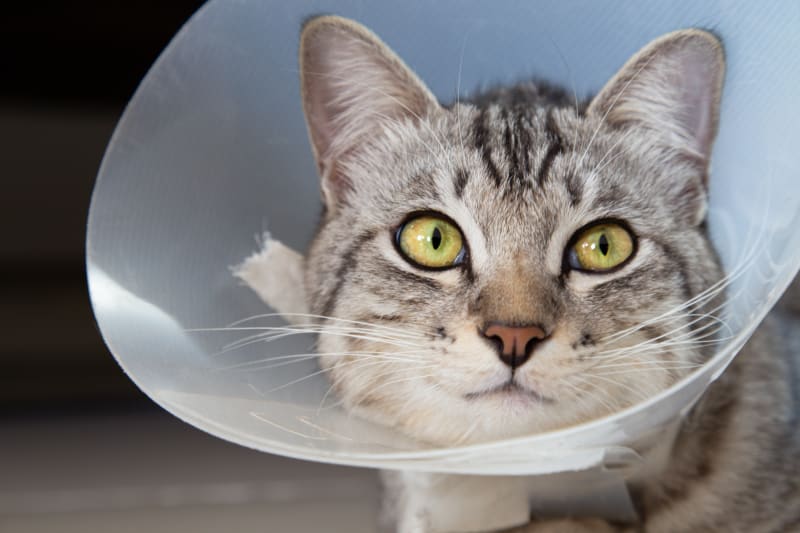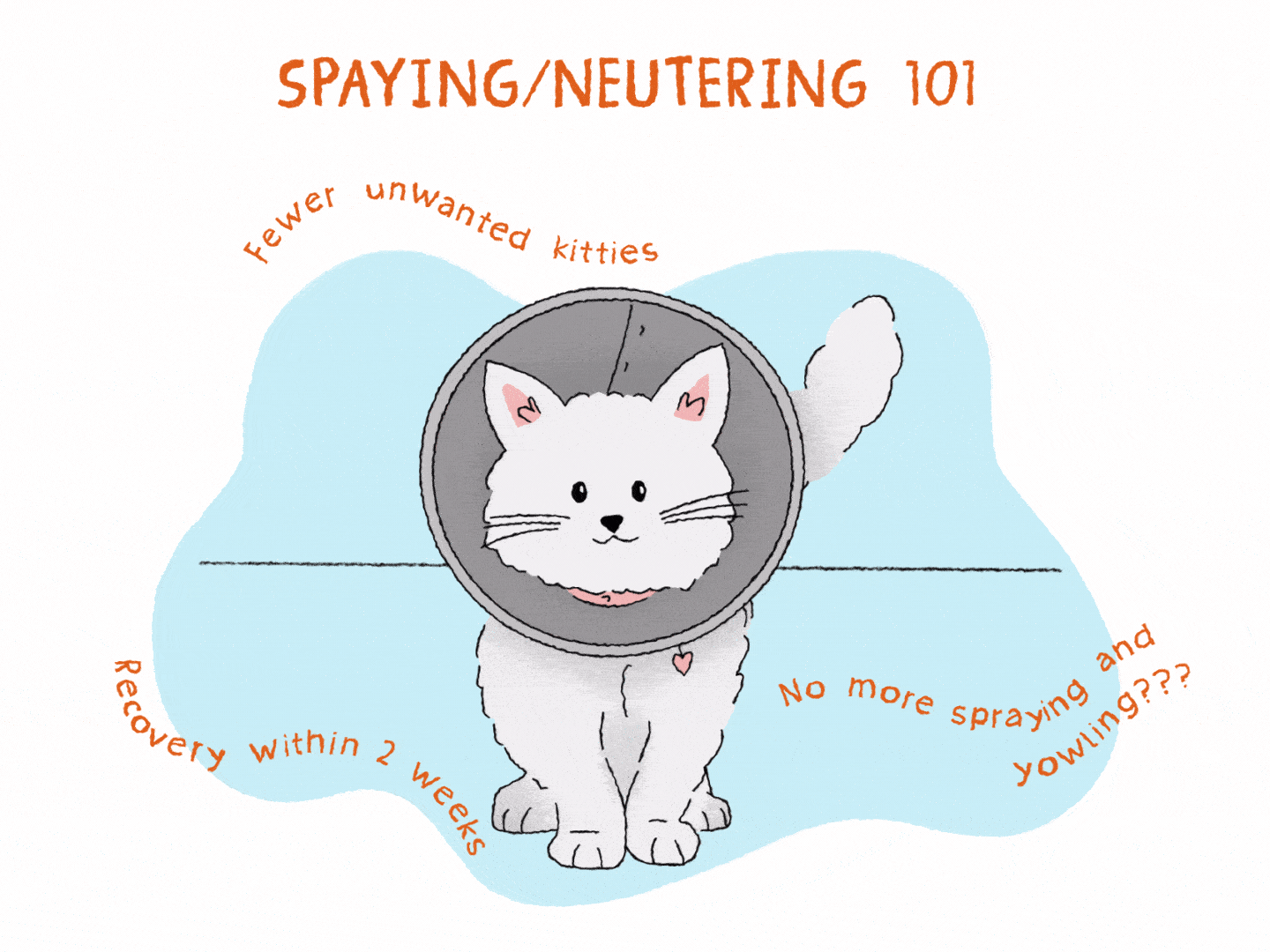Cats can be spayed or neutered as early as eight weeks old. Most veterinarians recommend fixing cats between four to six months.
Spaying or neutering your cat is a crucial step in responsible pet ownership. It helps control the pet population and reduces the risk of certain health issues. Many animal shelters and veterinarians advocate for early spaying or neutering. Cats can undergo these procedures safely at eight weeks of age.
The optimal age for fixing cats is typically between four to six months. This timing ensures they are healthy enough for surgery and minimizes behavioral problems. Early spaying or neutering can prevent unwanted litters and contribute to a longer, healthier life for your feline friend. Always consult your veterinarian for personalized advice.
Contents
Introduction To Spaying And Neutering
Spaying and neutering are essential procedures for your cat’s health. Spaying refers to removing the ovaries and uterus in female cats. Neutering involves removing the testicles in male cats. Both procedures prevent unwanted litters and reduce health risks.
Benefits Of Fixing Cats
Fixing cats offers numerous benefits. Here are some key advantages:
- Reduces the risk of certain cancers.
- Prevents unwanted pregnancies.
- Decreases aggressive behavior.
- Minimizes the urge to roam.
These benefits improve the quality of life for your cat. Spaying and neutering also contribute to community well-being. Fewer stray cats mean fewer health and safety issues.
Common Myths
Several myths surround spaying and neutering. Let’s address some common misconceptions:
| Myth | Fact |
|---|---|
| Fixing makes cats lazy. | Cats remain active and playful after surgery. |
| It changes their personality. | Fixing does not alter a cat’s personality. |
| It’s too expensive. | Many clinics offer affordable options. |
Understanding these myths helps make informed decisions. Fixing your cat is a responsible choice. It ensures a healthier, happier life for your feline friend.

Credit: todaysveterinarypractice.com
Ideal Age For Spaying
Spaying your cat is an essential part of responsible pet ownership. It prevents unwanted litters and offers several health benefits. So, what is the ideal age for spaying your feline friend? Here, we break down the best time for female cats and the health considerations involved.
Best Time For Female Cats
Experts recommend spaying female cats before their first heat cycle. This usually happens around five to six months of age. Some vets suggest spaying kittens as young as eight weeks old. Early-age spaying can prevent many health issues and behavioral problems.
Here is a quick guide to help you:
| Age | Spaying Status |
|---|---|
| 8 Weeks | Eligible for early spaying |
| 5-6 Months | Best time to spay |
| After First Heat | Still beneficial, but not ideal |
Health Considerations
Spaying your cat at the right age can minimize health risks. Early spaying reduces the risk of mammary tumors, which are often malignant in cats. It also eliminates the risk of ovarian and uterine cancers. Additionally, spaying prevents uterine infections, known as pyometra.
Let’s explore some health benefits in detail:
- Decreased risk of breast cancer
- Prevention of uterine infections
- Elimination of ovarian and uterine cancers
Spaying also helps in controlling the pet population. Fewer unwanted kittens reduce the burden on animal shelters. Early spaying also helps in managing behavioral issues. Cats are less likely to roam and mark their territory.
Always consult your vet for the best advice tailored to your cat’s needs. Your vet can provide the most accurate timing for spaying based on your cat’s health and development.
Ideal Age For Neutering
Neutering your cat is important for their health and behavior. But, when is the best time to do it? Knowing the ideal age helps in making the right choice for your furry friend. Let’s dive into the details.
Best Time For Male Cats
For male cats, the ideal age for neutering is between 4 to 6 months. This timeframe is crucial for many reasons:
- Prevents marking territory with urine.
- Reduces aggressive behavior.
- Decreases the risk of roaming.
Early neutering can prevent unwanted behaviors. It also ensures your cat remains healthy and happy. If done too late, some bad habits might already be formed.
Behavioral Benefits
Neutering your cat brings many behavioral benefits:
- Reduces territorial aggression.
- Minimizes spraying and marking.
- Decreases the urge to roam.
A neutered cat is calmer and more affectionate. This makes them a better companion. They are also less likely to get into fights with other animals.
Neutering at the right age ensures your cat grows into a well-behaved pet. It also improves their overall quality of life.
Early Spay-neuter Programs
Early spay-neuter programs involve fixing cats at a young age. These procedures are often done before the cat reaches six months old. Early spay-neuter programs have gained popularity for many reasons.
Pros Of Early Procedures
There are several benefits to early spay-neuter procedures:
- Health Benefits: Early spaying can prevent certain cancers and infections.
- Behavioral Improvements: Neutered cats are less likely to spray or roam.
- Population Control: Reducing the number of unwanted kittens helps shelters.
- Faster Recovery: Younger cats often heal faster from surgery.
Potential Risks
While there are many pros, some risks exist with early spay-neuter:
- Growth Concerns: Early procedures might affect bone growth.
- Hormonal Changes: Hormone levels can be altered, affecting development.
- Surgical Risks: All surgeries carry some risk, even for young cats.
Weighing the pros and cons is essential. Consult your vet to make the best decision for your cat.
Veterinarian Recommendations
Understanding the right age to spay or neuter your cat is crucial. Veterinarians provide valuable insights to ensure your pet’s health and well-being.
Expert Opinions
Experts generally recommend fixing cats between 4 to 6 months old. This age range is ideal for preventing unwanted behaviors and health issues.
According to the American Veterinary Medical Association, spaying or neutering at this age reduces the risk of certain cancers and infections.
Many animal shelters also support early-age spaying and neutering. They argue it helps control the pet population and improve overall feline health.
Tailored Advice
Veterinarians consider individual factors before making a recommendation. These include the cat’s breed, health status, and living environment.
Some breeds may benefit from slightly delayed procedures. A vet can provide guidance tailored to your cat’s specific needs.
For instance, larger breeds might mature slower and need a different timeline. Always consult your vet for the best advice.
Here’s a quick reference table for common recommendations:
| Factor | Recommendation |
|---|---|
| General Health | 4 to 6 months |
| Specific Breeds | Consult your vet |
| Living Environment | Varies, consult your vet |

Credit: www.fallsroad.com
Post-procedure Care
After your cat gets fixed, proper post-procedure care is essential. It helps them recover quickly and stay healthy. Here are some important steps for effective post-procedure care.
Immediate Aftercare
Immediate aftercare is crucial for your cat’s recovery. Follow these simple steps to ensure your cat feels comfortable and safe:
- Keep your cat in a quiet, comfortable space.
- Limit their physical activity for at least 10 days.
- Check the incision site daily for any signs of infection.
- Prevent your cat from licking the wound. Use an e-collar if needed.
- Offer small, frequent meals and plenty of water.
Long-term Health Tips
Long-term health tips help your cat stay healthy after being fixed. Consider these tips:
- Maintain a balanced diet to prevent weight gain.
- Engage your cat in regular play to keep them active.
- Schedule regular vet check-ups to monitor their health.
- Ensure they have a stress-free environment.
- Provide mental stimulation through toys and puzzles.
These post-procedure care tips ensure your cat’s smooth recovery and long-term health. Your attention and care will help them lead a happy, healthy life.
Common Concerns
Many pet owners worry about getting their cats fixed. They often have questions about the surgery and recovery. Let’s address some common concerns.
Surgical Complications
Surgical complications are rare but possible. The most common risks include bleeding and infection. Vets take precautions to minimize these risks. They use sterile instruments and follow strict protocols.
Make sure your vet is experienced. Ask about their success rate. An experienced vet can reduce the chances of complications. They can also provide the best care for your cat.
| Complication | Frequency | Prevention |
|---|---|---|
| Bleeding | Rare | Experienced vet, proper technique |
| Infection | Rare | Sterile instruments, antibiotics |
Recovery Time
The recovery time for cats after being fixed is usually short. Most cats recover within 10-14 days. During this period, keep your cat indoors and quiet. Limit their activity to help healing.
Check the surgery site daily. Look for redness or swelling. Contact your vet if you notice any issues. Follow your vet’s instructions for care and medications.
- Keep your cat indoors
- Limit their activity
- Check the surgery site daily
- Follow vet instructions

Credit: www.banfield.com
Frequently Asked Questions
What Is The Best Age To Spay A Kitten?
The best age to spay a kitten is around 5 to 6 months old. This timing helps avoid unwanted pregnancies and health issues. Always consult your veterinarian for personalized advice.
What Happens If You Neuter A Cat Too Early?
Neutering a cat too early can lead to health issues. It may affect their growth and urinary tract development. Always consult your vet for the best timing.
Why Wait 6 Months To Neuter A Cat?
Neutering a cat at 6 months ensures they are physically mature. It reduces health risks and behavioral issues.
How Old Does A Kitten Have To Be To Be Neutered?
Kittens should be neutered at 8 to 12 weeks old. Early neutering is safe and helps prevent unwanted litters. Consult your vet for the best timing.
Conclusion
Getting your cat fixed at the right age is crucial for their health and behavior. Typically, vets recommend spaying or neutering cats around 4 to 6 months old. This timing helps prevent unwanted litters and reduces health risks. Consult your vet for personalized advice, ensuring your cat’s best care.

Katie Lindsey is a passionate cat lover and founder of Cats Solution, a comprehensive resource for all things feline. With a lifelong love for cats and extensive knowledge in their care and behavior, she provides expert advice and solutions to cat owners. Through her website, Katie fosters a supportive community where cat enthusiasts can find guidance and heartwarming stories. A dedicated advocate for animal welfare, Katie also promotes responsible pet ownership and adoption. Join her on this purr-fect journey celebrating the joy of feline companionship.



